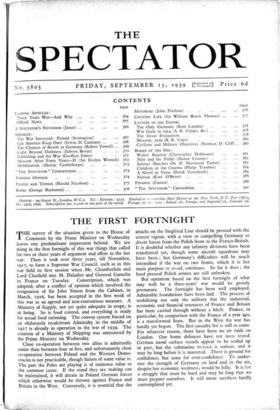THE FIRST FORTNIGHT
T HE survey of the situation given to the House of Commons by the Prime Minister on Wednesday leaves one predominant impression behind. We are doing in the first fortnight of this war things that called for two or three years of argument and effort in the last war. Then it took over three years, till November, 1917, to form a Supreme War Council, such as in this war held its first session when Mr. Chamberlain and Lord Chatfield met M. Daladier and General Gamelin in France on Tuesday. Conscription, which was adopted, after a conflict of opinion which involved the resignation of Sir John Simon from the Cabinet, in March, 1916, has been accepted in the first week of this war as an agreed and non-contentious measure. A Ministry of Supply, not yet quite adequate in scope, is in being. So is food control, and everything is ready for actual food rationing. The convoy system forced on an obdurately recalcitrant Admiralty in the middle of 1917 is already in operation in the war of 1939. The creation of a Ministry of Shipping was announced by the Prime Minister on Wednesday.
Close co-operation between two allies is admittedly easier than between four or five, and unfortunately close co-operation between Poland and the Western Demo- cracies is not practicable, though liaison of some value is. The part the Poles are playing is of immense value to the common cause. If the stand they are making can be maintained, it will detain in Poland German forces which otherwise would be thrown against France and Britain in the West. Conversely, it is essential that the attacks on the Siegfried Line should be pressed with the utmost vigour, with a view to compelling Germany to divert forces from the Polish front to the Franco-British. It is doubtful whether any infantry divisions have been transferred yet, though some aircraft squadrons may have been ; but Germany's difficulties will be much intensified if the war on two fronts, which it is her main purpose to avoid, continues. So far it does ; the hard pressed Polish armies are still unbroken.
But optimism based on the first fortnight of what may well be a three-years' war would be grossly premature. The fortnight has been well employed. Admirable foundations have been laid. The process of mobilising not only the military but the industrial, economic and financial resources of France and Britain has been carried through without a hitch. France, in particular, by comparison with the France of a year ago, is a transformed State. But in the West the war has hardly yet begun. The first casualty list is still to come. For whatever reason, there have been no air raids on London. Our home defences have not been tested. German naval surface vessels appear to be sealed up in port, but the submarine m :mace is serious, and it may be long before it is mastered. There is ground for confidence, but none for over-confidence. To under- rate the strength of Germany on land and in the air, despite her economic weakness, would be folly. It is for a struggle that must be hard and may be long that we must prepare ourselves. It will mean sacrifices hardly contemplated yet.


































